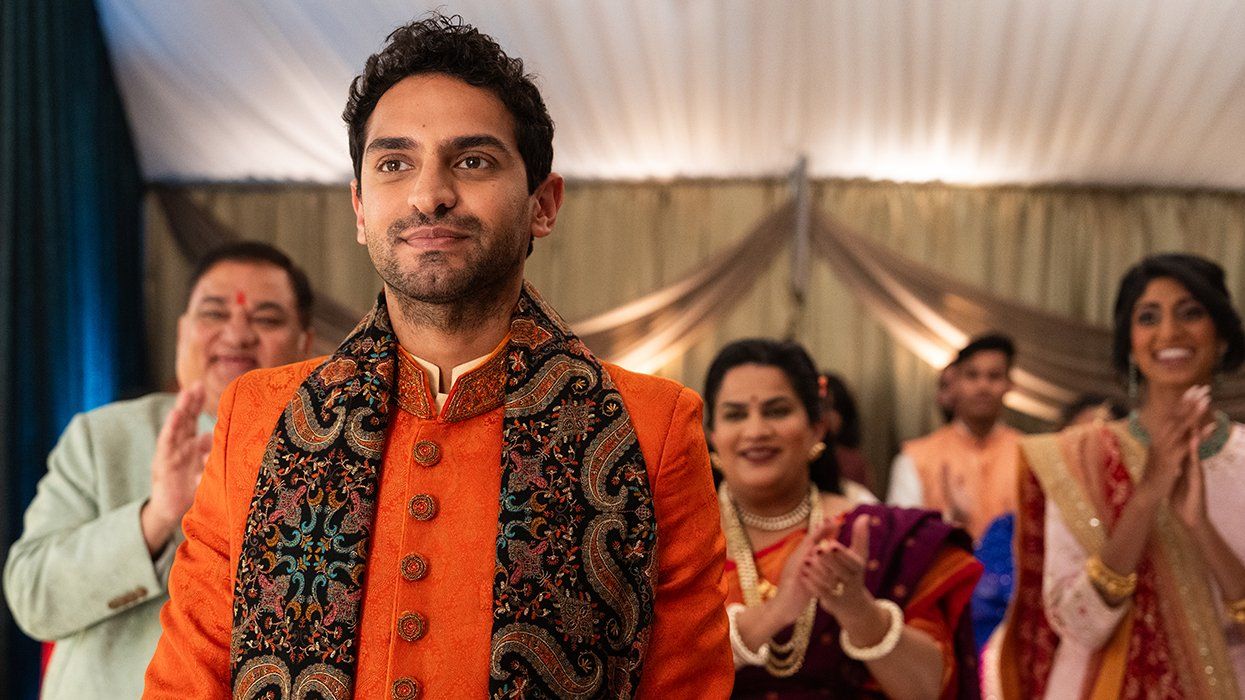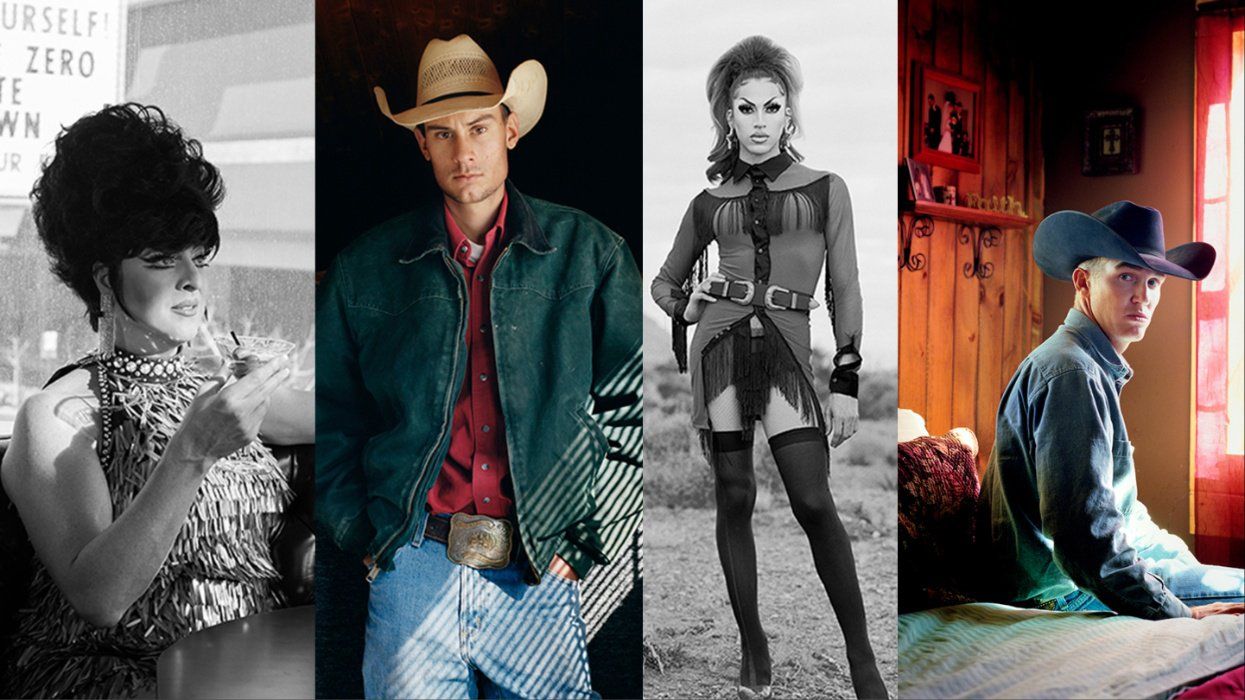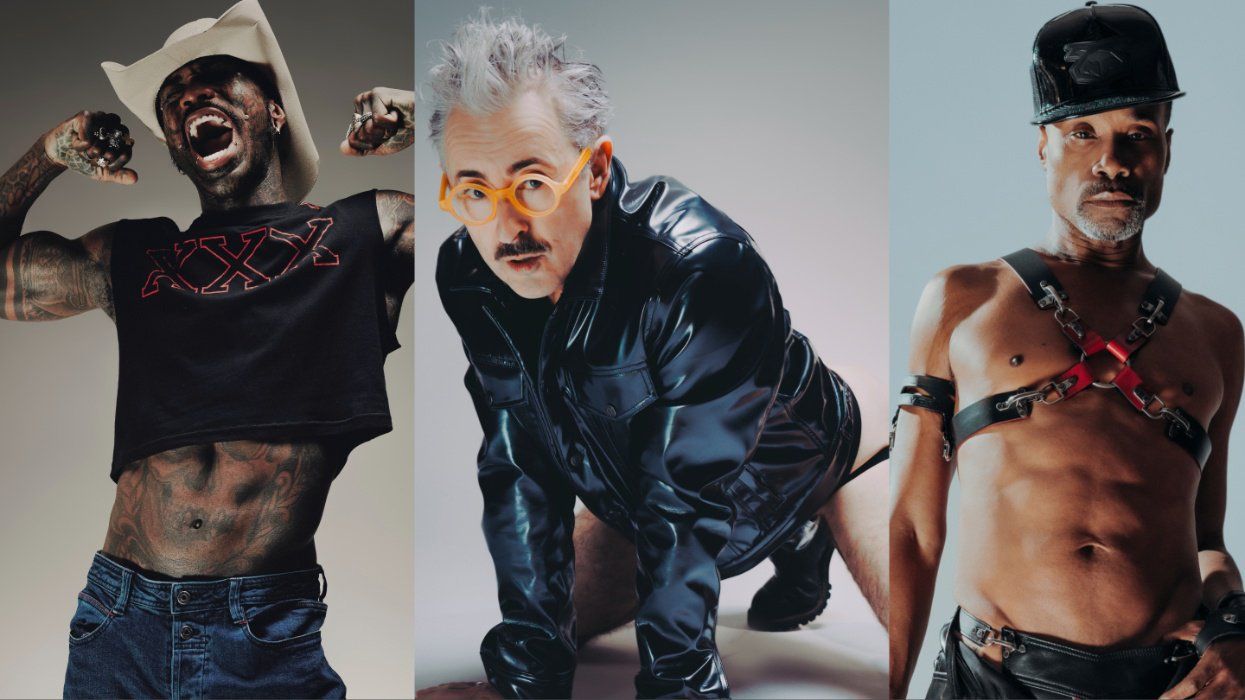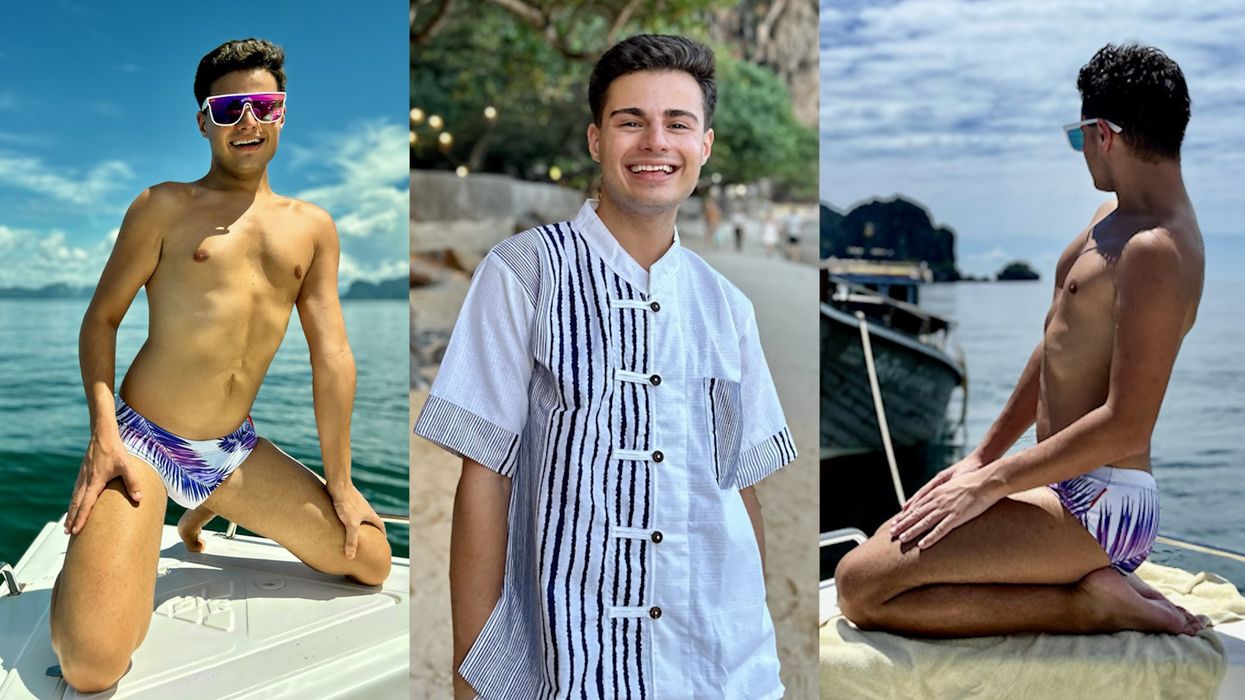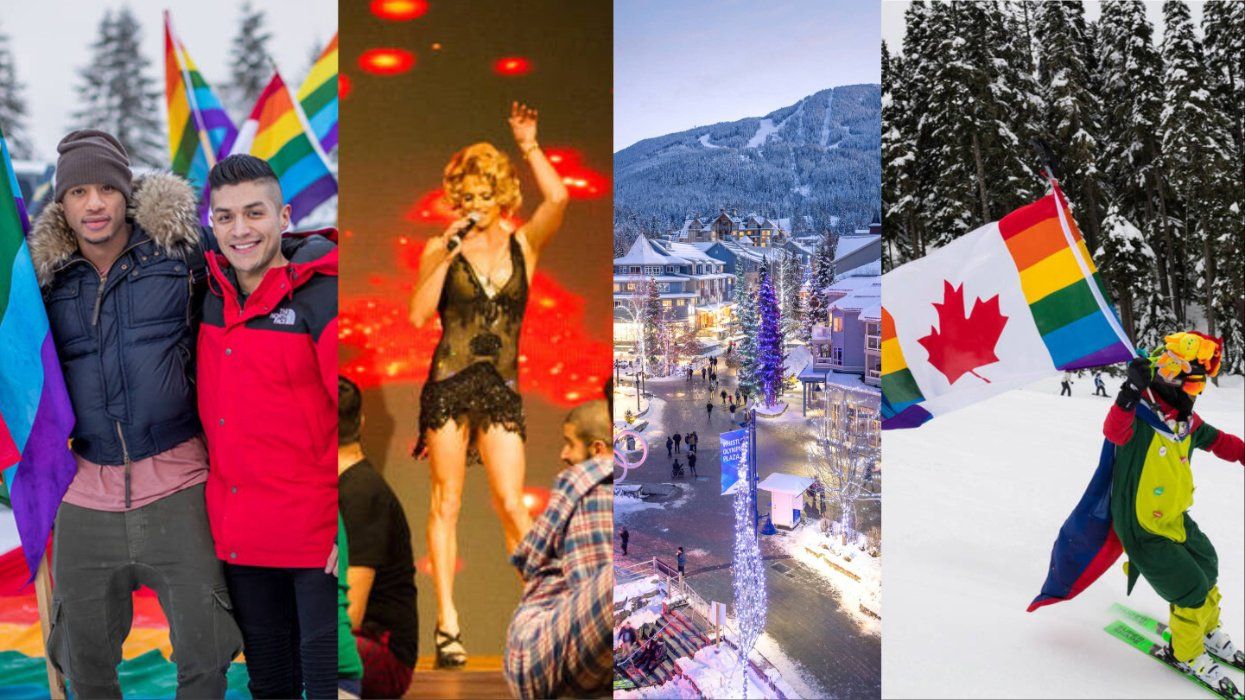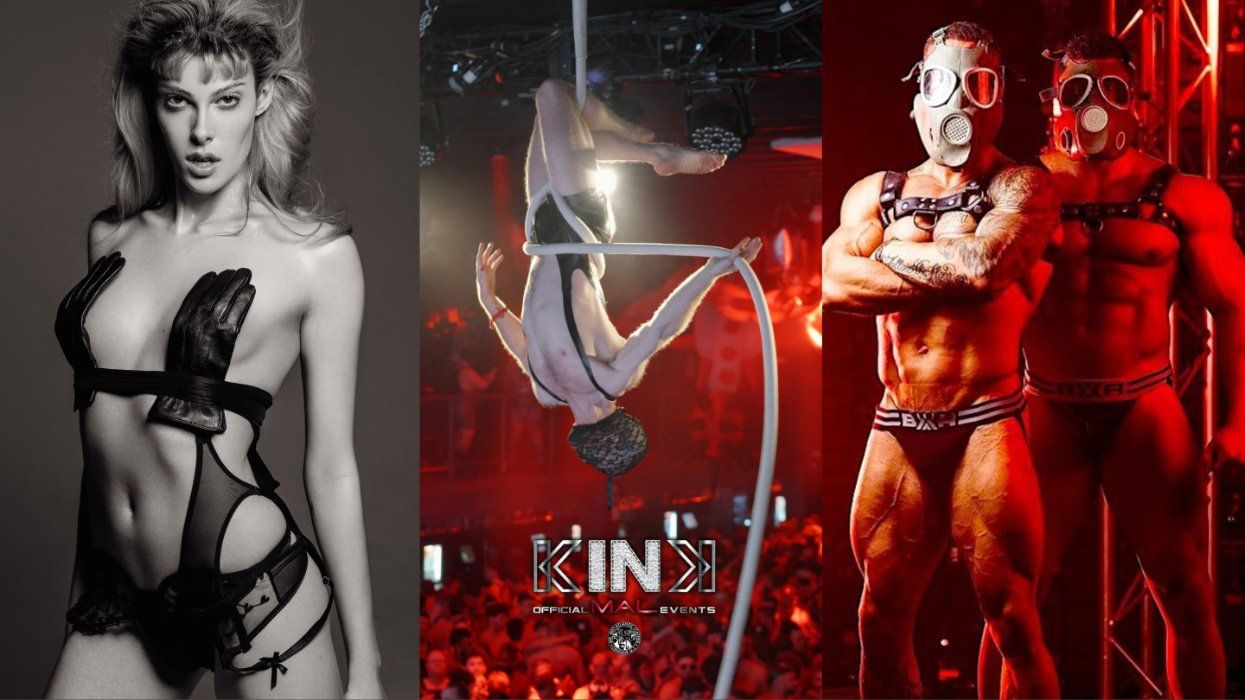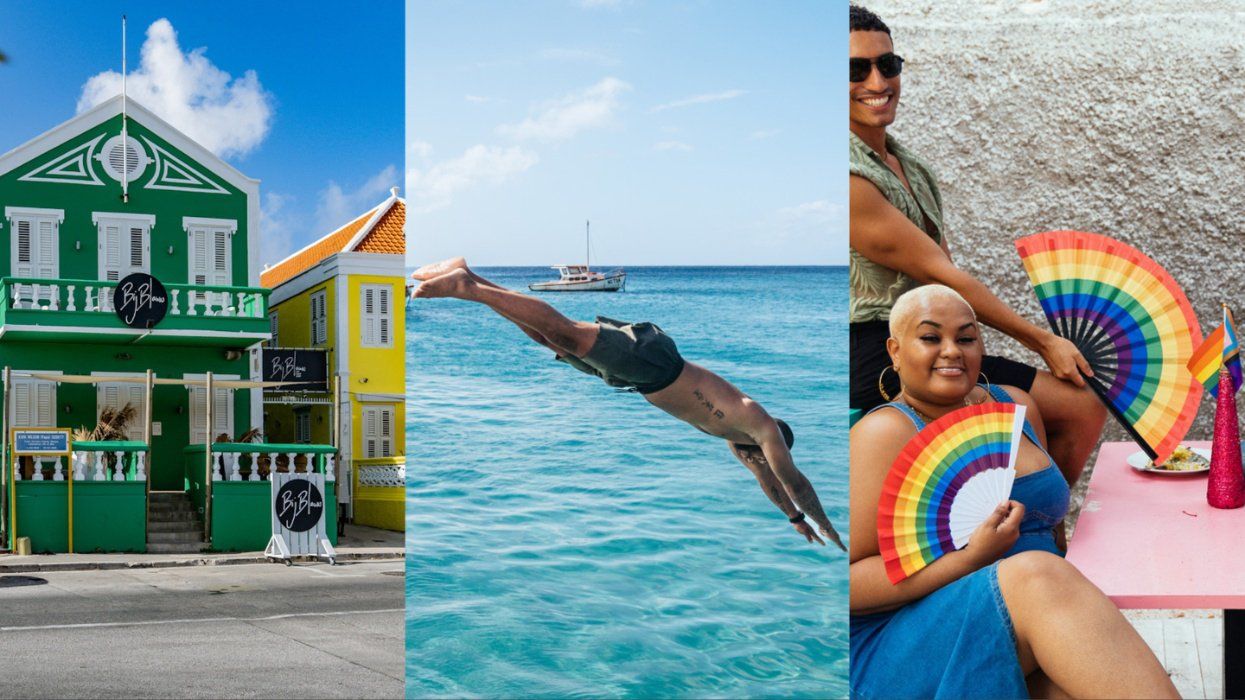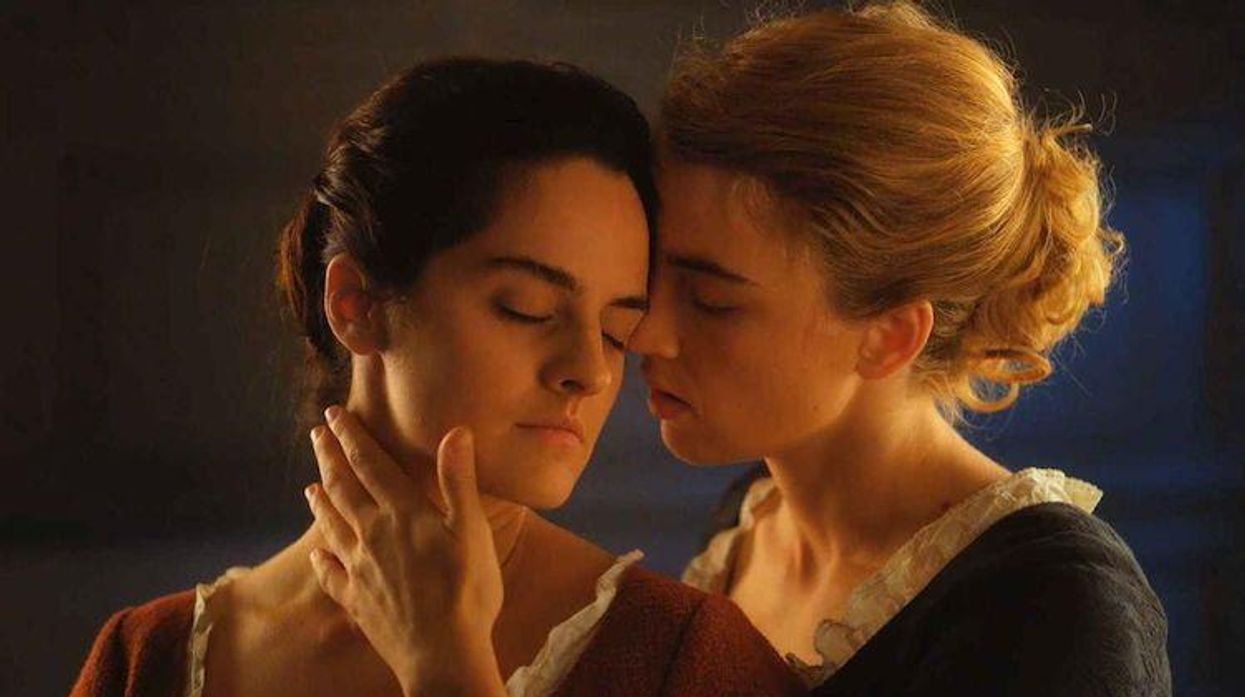CONTACTAbout UsCAREER OPPORTUNITIESADVERTISE WITH USPRIVACY POLICYPRIVACY PREFERENCESTERMS OF USELEGAL NOTICE
© 2025 Equal Entertainment LLC.
All Rights reserved
All Rights reserved
Scroll To Top



















By continuing to use our site, you agree to our Privacy Policy and Terms of Use.
The 15 Best LGBTQ+ TV Shows of 2020
The 15 Best LGBTQ+ TV Shows of 2020

It's been a knockout year for LGBTQ+ television -- and thank heavens, since the world has been in lockdown for the majority of it. Below, see Advocate editors' favorite comedies, dramas, and dramedies that have been broadcast and streamed this year.
Wynonna Earp

This July, the Syfy series Wynonna Earp was among one of the first shows to get back to work to finish shooting its hard-fought fourth season.
Early in 2019, with tenuous funding for the fourth season, its fate was up in the air. Devoted fans of the supernatural series kicked off the #FightForWynonna campaign, which included electronic billboards in Times Square that emphasized their love for the series. It's not surprising that the series, pioneering in its continual subverting of the tropes of the Western genre by pulling women out of the domestic space and placing them in iconic, traditionally male roles with its lead character, a bounty hunter, and the town of Purgatory's sheriff (a lesbian, no less), was among the first to innovate and get back into production.
Wynonna Earp, like its scrappy team of demon hunters made up mostly of women, including its sardonic and loveable titular lead (played by Melanie Scrofano) and/or queer people (with the exception of Tim Rozon's forward-thinking, 130-year-old immortal Doc Holliday), has been knocked down and come back fighting. And it continually bounces back stronger and more culturally vital than before, in part because of its unique symbiosis with its fandom. Nowhere is the show's vitality more apparent than in its depiction of "WayHaught," one of the most enduring and beloved queer couples on TV that includes Dominique Provost-Chalkley's bisexual Waverly Earp (little sis to Wynonna) and Katherine Barrell's Nicole Haught, the aforementioned lesbian sheriff. What makes the on-screen relationship even more authentic is that both actresses are out in real life.
Vida

Creator and showrunner Tanya Saracho, who is queer and Latinx, delivered a world of possibility for people who'd never seen themselves depicted on-screen before in her Latinx series Vida, which premiered in the spring of 2018.
Even before its premiere, Vida was game-changing. Saracho, a playwright who had written for Looking and How to Get Away With Murder, staffed Vida's writers' room overwhelmingly with Latinx people, queer people, and women.
The Starz show, which premiered its third and final season in April, tells the story of disparate sisters Lyn (In the Heights' Melissa Barrera) and Emma (Riverdale's Mishel Prada) searching for a way to run their mother Vidalia's failing bar and apartment building in the wake of her death.
When they return home from far-flung places, they discover that their Vida married a woman, Eddy (nonbinary actor Ser Anzoategui), after having exiled Emma for being queer.
Vida, with its mix of humor and heart, delves into topical issues including gentrification, the intersections of queer and Latinx identities, colorism, and identity policing among queer people.
"When I started this, the landscape was a bleak one for Latinx representation. In the television landscape, the narratives about us were few and far between and were stuck on stereotypical," Saracho wrote in a letter announcing that the third season would be Vida's swan song.
"We were gifted three beautifully compelling, trailblazing seasons of television," Saracho said. "Your support has meant everything. It has meant two renewals and validation that our brown narrative is worth telling."
The Umbrella Academy

In the second season of Netflix's The Umbrella Academy, in the wake of a barely thwarted apocalypse and having traveled 56 years back in time to escape said devastation, the latent superpower prodigy Vanya Hargreeves finds love with another woman more kinetic than the powerful soundwaves she manipulates. The hopeful love story in the show about superhero siblings that's set at a time when the only depictions of queer women on-screen ended with madness, a forced return to men, or even death rewrites the painful tropes that often befell queer women of the era. The love story between Vanya (Elliot Page) and Sissy (Marin Ireland), a housewife who discovers her authentic self, is one of the most grounding pieces of the show's overall excellent sophomore season.
"We just really wanted to be mindful about how to be sensitive, how to show the joy and the beauty, and then the obvious obstacles at the time," Page told The Advocate this summer.
Twenties

In Lena Waithe's Twenties, which premiered earlier this year on BET, Jonica "Jojo" Gibbs plays Hattie, an aspiring TV writer who lands a plum job working for Ida B. (Sophina Brown), one of the most successful Black female showrunners in Hollywood. The breezy, uplifting series follows Hattie as she navigates work, how to be a good daughter while also striking out on her own, and hanging out with her best friends, Nia (Gabrielle Graham) and Marie (Christina Elmore). But in its quiet way, with Hattie, a Black masculine-of-center queer woman at its heart, the series is boundary-pushing.
"In terms of representation, I think it's important for any demographic to be able to see themselves on television and to be able to feel some type of normalcy in what they feel," Gibbs, who is out, said on Inside With the Advocate. "As a kid, I never saw gay people on TV, so what I was dealing with internally, I didn't know. I felt like I couldn't tell anybody, because who else can relate?"
"Having Hattie on TV as a masculine-presenting queer person -- female -- I think it's revolutionary," Gibbs adds. "And it's necessary. People need to see people in their uniqueness and their comfortable space, and someone who's confident in being themselves."
What We Do in the Shadows

What We Do in the Shadows -- FX's show about a Staten Island household of vampires and their human familiar -- is one of cable TV's queerest comedies. Every vampire is queer, having had a relationship with a being of the same gender at some point in their centuries-long lives. And no stigma exists for them regarding these romances. Moreover, the show's heart is anchored by a queer Latinx actor, Harvey Guillen, whose character Guillermo grapples with his homoerotic longing to serve his master Nandor (Kayvan Novak) and embrace an ancestry that includes a famous vampire hunter. Laszlo (Matt Berry), with his gay porn history, and his wife, Nadja (Natasia Demetriou), who seduced Beanie Feldstein, are the witch-skin hat on this bloody cake.
Schitt's Creek
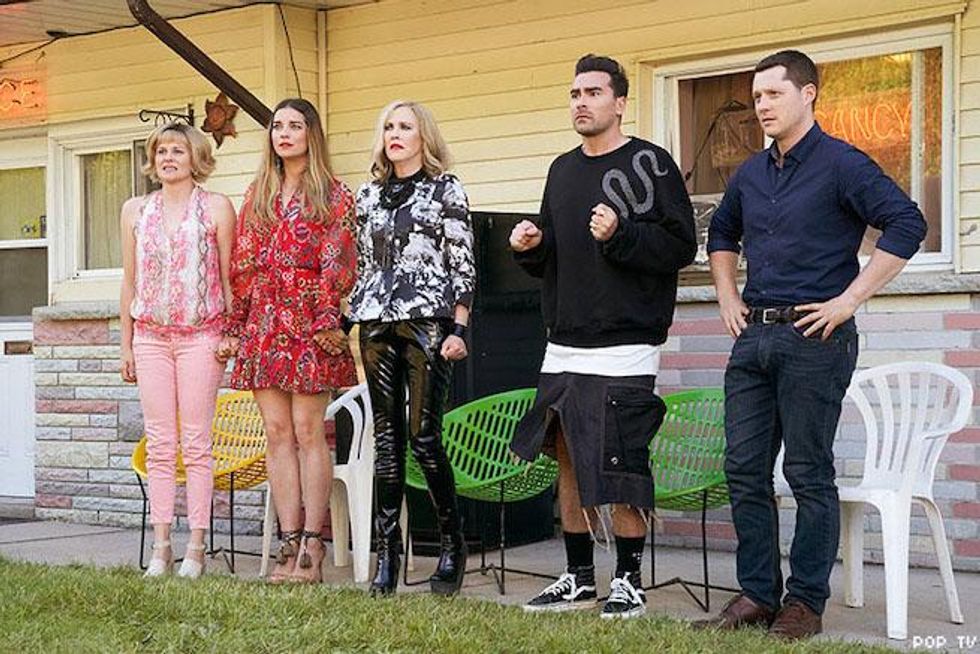
Schitt's Creek is more than just a comedy. The series about a rich family that loses its fortune and must move to a hick town swept the Emmys this year in its final season for a reason. As co-creator and star Eugene Levy said in his awards speech, the show is "a celebration of inclusivity, a castigation of homophobia, and a declaration of the power of love." His son, co-creator Dan Levy, broadcast this message through his character, David, whose relationship with Patrick (Noah Reid) is one of TV history's sweetest gay love stories. Add gay icons Catherine O'Hara as the matriarch, Moira, and Annie Murphy as the sassy sister, Alexis, and Schitt's Creek is queer TV perfection.
Ratched

In series that takes place at a time when queer people existed in the movies in the margins and were referred to in coded ways, Ratched sure does love its food metaphors -- a peach, oysters, and the nutritional value of bologna figure prominently. An origin story for the sadistic Nurse Ratched from the Best Picture Oscar-winner One Flew Over the Cuckoo's Nest, the eight-part Netflix series from Ryan Murphy and Evan Romansky stars Sarah Paulson as the mysterious Mildred Ratched.
A nod to Hollywood genre films of the era (the years just following World War II), Ratched, with its saturated tones and Classical Hollywood split-screen action, is equal measures noir, horror, and melodrama. It's also deeply queer. Mildred strikes up a relationship with Vincent D'Onofrio's Trumpian governor's lesbian press secretary Gwendolyn (Cynthia Nixon), and then women go all in.
"I don't think there should be any kind of litmus test for who gets to play what kind of parts, but I think having two queer women playing these two queer characters was an enormous boon," Nixon told The Advocate about what she and Paulson, who are both out, brought to the piece.
A scene in which Mildred and Judy Davis's Nurse Betsy Bucket argue over a peach is one of the campiest moments on TV to date. If that weren't enough to argue Ratched's camp bona fides, Sharon Stone and Amanda Plummer costar as well as Finn Wittrock, Jon Jon Briones, and Sophie Okenedo.
The Queen's Gambit
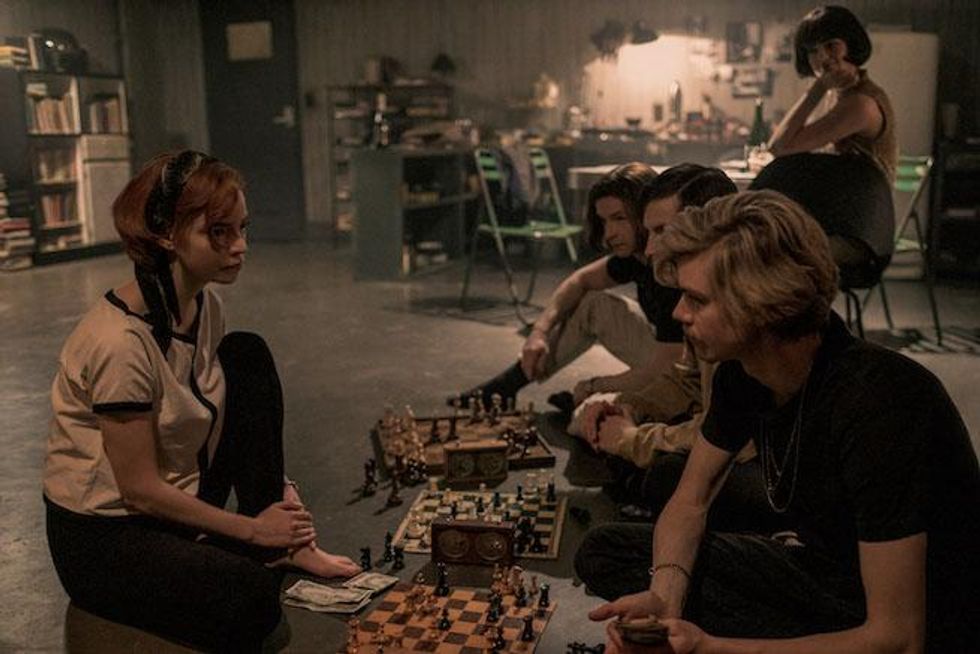
The acclaimed show The Queen's Gambit broke Netflix records this year in terms of viewership. An internet search for the series that stars Anya Taylor-Joy (Emma., The Witch, Thoroughbreds) as Beth Harmon, an orphan and a chess prodigy who takes on that world of men in the '60s, turns up dozens of articles applauding the show's perspicacious understanding of chess, its stylistic flourish, and the performances, particularly by Taylor-Joy and Can You Ever Forgive Me? director Marielle Heller as her melancholic adoptive mother, Alma. But not many articles delved into the show's queerness.
It's also the second massive hit series on Netflix this fall with a queer female lead (Ratched being the other). Additionally, the only man Beth says she's ever loved is a gay man who loves her deeply, although platonically.
Evidence of Beth's tryst with a woman is over in a blink in the sixth episode. But it is a catalyst for Beth losing badly for a second time to the world champion Russian chess star Vasily Borgov (Marcin Dorocinski), something that sends her on a destructive spiral and eventually on an upswing that brings Beth her greatest success.
The moment is so pivotal in the series based on Walter Tevis's 1983 novel that the entire show begins with snippets of a scene in a Paris hotel room in which Beth is presumably still drunk and strung out from a night of partying. As she heads out to her match against Borgov, bleary-eyed, she gazes at someone in her bed. A tousled head of dark hair is all that's visible from the camera angle. Then The Queen's Gambit's first episode starts from the beginning in Beth's childhood and with her chess prodigy origin story. The audience doesn't see who's in her bed for several episodes to come.
Motherland: Fort Salem

Witches in uniform are tasked with saving the world in Freeform's freshman series Motherland: Fort Salem. Set in an alternate America where witches made a deal with the government to fight for the country in return for ending their persecution, the series focuses on a trio of young witches, Raelle (Taylor Hickson), Abigail (Ashley Nicole Williams), and Tally (Jessica Sutton), who must work as a team to survive training at Fort Salem.
The series from Claws creator and executive producer Eliot Laurence follows the young women as they hone their powers of magic to defeat a common, mutable enemy that is staging terrorist attacks.
Motherland establishes its queer credentials early in the pilot episode when Raelle meets the mysterious and compelling Scylla (Amalia Holm) and sparks immediately fly. Before the end of the episode, the women have cemented a fiery physical relationship, although it's soon revealed that Scylla is not all that she appears to be. Still, the show's overt queerness and what appears to be an unbreakable bond between Raelle and Scylla made them one of the most shipped couples of the year in a series that is stylistically gorgeous and politically timely.
Love, Victor

Mega-producer Greg Berlanti's big-screen gay love story Love, Simon made a splash when it dropped in theaters. Now comes Hulu's TV series Love, Victor, which features lead Victor (Michael Cimino) coming into his identity with a little help from writing to Simon, the gay teen whose epic love story endures at Victor's new school.
The series begins with Victor's family moving from Texas to Atlanta, where Victor and his often-moody sister, Pilar (Isabella Ferreira), adjust to life in a new town and a new high school. There, basketball star and all-around ideal student Victor begins exploring his sexual identity while dating the sweet, popular girl Mia (Rachel Hilson) and crushing on the out gay kid Benji (George Sear). Not long after he sets foot in his new high school, he's informed of the lore of Simon and his first kiss on a Ferris wheel with the entire school watching and cheering. That's when Victor begins writing to college-aged Simon for advice.
Ultimately, Love, Victor is a worthy follow-up to its groundbreaking predecessor and an encouraging spot of gay representation in a genre that has lacked it. Now, if only Disney+ would air it!
Lovecraft Country

Developed by Misha Green from the 2016 novel by Matt Ruff, HBO's Lovecraft Country is a breakthrough show in the genres of supernatural horror and science fiction, as it is told from the perspectives of historically marginalized characters. Loosely inspired by the tales of H.P. Lovecraft, the series centers on a Black man in 1950s America, Atticus (Jonathan Majors), who discovers he has magic in his family lineage, which he must use to battle other magical characters who use their powers for white supremacy. Lovecraft Country is notable for featuring several LGBTQ+ characters as well, namely Atticus's closeted father, Montrose (Michael K. Williams), and Ruby (Wunmi Mosaku), who engages in body transformations and sexual relations with a female character, Christina Braithwhite (Abbey Lee). Although the series made a misstep in the portrayal of a two-spirit Indigenous character, who was brutally murdered, Green admitted that she "failed" in this storyline and vowed to do better.
Love in the Time of Corona

Film and TV production grounded to a halt as shelter-in-place orders went into effect in March. While the future of an industry relying on close contact and intimacy for powerful storytelling hung in the balance, Joanna Johnson, co-creator and executive producer of the pioneering LGBTQ+ show Good Trouble and an executive producer of The Fosters, leaped into action with a show about connection during isolation.
By May 1, she had the green light for Love in the Time of Corona, an of-the-moment four-part series that encapsulates the anxieties, isolation, and reconnection with loved ones that defined the early days of the pandemic. Even as she was carving a path of pure innovation in terms of how to make TV or film amid a pandemic, knowing that telling socially relevant stories is also the future of Hollywood, in Love in the Time of Corona, she deftly telegraphed the lead-up to the worldwide outcry against police brutality toward Black people and systemic racism that would occur a few months into quarantine in a story that unfolds through characters played by Hamilton's Leslie Odom Jr. and Nicolette Robinson (who are married in real life).
The series from Johnson, who is out, also featured a queer love triangle featuring real-life friends Tommy Dorfman, who is nonbinary, and Rainey Qualley. They play Oscar and Elle, friends who are coping with Oscar falling for a man they meet video dating while they also sort through the love they share for each other that's heightened in lockdown.
Hollywood

When creating Netflix's Hollywood, producers Ryan Murphy and Janet Mock set out to create a revisionist history of Tinseltown in which people of color and queer actors had the opportunity to shine in mid-century America. They succeeded, creating a fairy tale that also speaks to the struggles marginalized people face in the present-day entertainment industry.
There's the screenwriter Archie (Jeremy Pope), who's gay and Black; Camille, the Black ingenue longing to break out of being relegated to roles as servants; and the director Raymond Ainsley, played by Murphy regular Darren Criss, who's Filipino but passes as white. At the center is Patti LuPone's Avis Amberg, the whip-smart woman over 70 who's married to the studio head and who will soon become the linchpin on whom Murphy's aspirational, revisionist history of Hollywood turns. And all of them, including Holland Taylor's studio maven Ellen Kincaid, Mira Sorvino's Jeanne, who's on the verge of aging out for good, and Joe Mantello's closeted gay studio executive Dick, get their own success stories.
"I wanted to do something specifically on three Hollywood icons who had, I believed, really been treated poorly," Murphy tells The Advocate. "That was Rock Hudson and Anna May Wong and Hattie McDaniel. I was very interested in them, even as a kid."
Indeed, Hudson (Jake Picking) plays a pivotal role in Hollywood as the closeted gay actor abused by his lecherous agent, Henry (Jim Parsons, playing into and then breaking down Hollywood's trope of the villainous, predatory queen). Hollywood's Hudson, who finds himself competing with the straight guy Jack for roles, also finds real love with Archie, thus layering their outsider status as a queer interracial couple.
Hightown

Hightown is a murder mystery from Starz that's set in the LGBTQ+ mecca of Provincetown, Mass. The series from creator Rebecca Cutter is dark, sexy, and very queer, especially with out former Chicago Fire star Monica Raymund in the lead role as Jackie Quinones, a party-happy lesbian and fisheries agent who stumbles across the body of a woman who's been murdered and dumped on one of Provincetown's storied beaches.
Filmed in Provincetown last summer with Oscar-nominated cinematographer Rachel Morrison (Mudbound, Fruitvale Station) at the helm of the first couple of episodes, Hightown sets a strong visual tone from the outset. It captures the pure queer joy of Provincetown and also the underbelly of crime and sorrow in the wake of the opioid crisis. As Jackie races to uncover the mystery behind the murder, she also grapples with drug, alcohol, and sex addiction.
Hightown deftly balances the portrayal of the nautical industries in the town at the tip of the cape with its depiction of the queer life that has flourished there for nearly a century with the bars, shops, and restaurants that cater to LGBTQ+ people and the drag queens who line Commercial Street coaxing passers-by into their shows. The series costars Riley Voelkel, Shane Harper, Atkins Estimond, Amaury Nolasco, Dohn Norwood, and Crystal Lake Evans.
The Flight Attendant

Kaley Cuoco, who rose to prominence playing Penny on CBS's The Big Bang Theory, gives a star turn in HBO Max's The Flight Attendant as the alcohol-loving stewardess Cassie who wakes up next to a dead hookup and must grapple with the mystery of his murder. The miniseries, which includes Greg Berlanti among its executive producers, teems with queer sensibility: a mystery female assassin, a mafia-connected grieving mother, a lawyer friend played by Zosia Mamet, and the dead hottie Michiel Huisman haunting Cassie are among the over-the-top characters who lift the material into high camp. But there are plenty of meaningful LGBTQ+ roles as well, including T.R. Knight as Cassie's brother and Dear White People's Griffin Matthews as her sassy airline colleague. Rosie Perez, who is involved in a data-stealing scheme and an infatuation with Cassie, is also a standout.
I May Destroy You

HBO's I May Destroy You may be the best show of the year for its gut-punch performance by creator Michaela Coel, who explores the impact of rape through her character Arabella. However, Arabella is not the only person grappling with the fallout of sexual assault. Everyone around her is impacted, including Kwame (Paapa Essiedu). As a Black gay man, Kwame goes through his own hurdles in processing his assault, including encountering homophobia at the hands of a police officer. His story is almost never seen in mainstream media, and it is artfully and heartbreakingly told in the hands of Coel.
Dead to Me

During the second season of the Netflix breakout series Dead to Me, Judy, one of the lead characters, finds herself attracted to another woman and pursues it. It's a lovely if not unsurprising extension of the openhearted character played by Linda Cardellini, who is a persistent foil and erstwhile best friend to Christina Applegate's fractious and wonderfully foulmouthed Jen.
Judy shares clear chemistry with her love interest, Michelle (Natalie Morales), and they're good together. Still, Judy and Jen's relationship has resonated wildly with queer female fans since Dead to Me premiered. It is indisputably the show's central love story. And that's the way out creator Liz Feldman conceived of it -- as a love letter to female friendship.
After all, Judy and Jen do become a couple in so many ways via their shared experience and a certain emotional intimacy. Beginning with the series pilot, they drink together, talk endlessly on slumberless nights, and binge reruns of The Facts of Life with Jen proudly proclaiming, "I'm a Jo." Eventually, Judy moves in with Jen and becomes a de facto second parent to Jen's sons, who are mourning the loss of their dad, a victim of a hit-and-run.
With female friendship at its heart, a queer relationship in the periphery, and a solid anxiety-inducing mystery advancing the plot, Dead to Me remains one of the most binge-able and satisfying shows on TV.
Teenage Bounty Hunters

The beloved Teenage Bounty Hunters on Netflix became another victim of a show with queer women at its center getting canceled after a single season (along with Everything Sucks and I Am Not Okay With This). The series about fraternal twins Sterling (Maddie Phillips) and Blair (Anjelica Fellini) at a Christian school who navigate burgeoning sexual desire with stumbling into a side gig as bounty hunters introduced the queer storyline late in the series. Eventually, a relationship blossoms between frenemies Sterling and the good Christian mean girl April (Devon Hales). With nuance toward one girl coming out in an essentially evangelical household and the other embracing fluidity, the love story is one of the best of the year. Sadly, there will be no resolution for Sterling and April unless the fan-launched #saveteenagebountyhunters Hail Mary campaign catches the eye of another network.
Kipo and the Age of the Wonderbeasts

Kipo and the Age of the Wonderbeasts blessed Netflix audiences with not one but three seasons of adventure led by three young people of color saving a post-apocalyptic world by uniting humans and mutated intelligent animals. The show is remarkable not only for its message on the power of diversity but also due to Benson (Coy Stewart), a Black gay lead who made history by coming out (and finding a love interest!) in a youth-oriented animated series.
Latest Stories
LGBTQ+ History Month: 33 queer movies to watch on streaming
October 02 2025 9:02 AM
Drag Me to the Catskills: A weekend of camp and comedy in the woods
May 29 2025 8:30 PM
Boys! Boys! Boys! podcast: A new voice in queer culture
May 01 2025 5:03 PM
Cobblestones, castles, and culture: Your LGBTQ+ guide to Edinburgh
April 30 2025 12:44 PM
No Pride flags needed in French Polynesia
April 07 2025 11:16 AM
Out and About with Karan Soni
April 04 2025 8:00 AM
Jane Hilton's 'Cowboys & Queens' captures the modern American dream
March 28 2025 6:27 PM
Redefining LGBTQ+ luxury at sea: Virgin Voyages' Resilient Lady experience
February 25 2025 8:24 AM
Take a long, hard look at the Real Nasty Pigs of New York
January 14 2025 4:20 PM
Discover why Thailand is the ultimate LGBTQ+ paradise
January 14 2025 10:00 AM
Join the fun at Whistler Pride 2025
January 09 2025 3:00 PM
Get ready to unleash your kink at MAL Weekend 2025
January 07 2025 3:14 PM
French Polynesia LGBTQ+ island hopping guide
January 07 2025 8:15 AM
Get ready for Aspen Gay Ski Week 2025
December 23 2024 4:24 PM
Out and About with Billy Eichner
December 20 2024 3:25 PM
Explore dushi Curaçao: Your colorful LGBTQ+ Caribbean oasis
December 16 2024 1:45 PM
31 Period Films of Lesbians and Bi Women in Love That Will Take You Back
December 09 2024 1:00 PM
Gay blind traveler Henry Martinez embraces Greater Fort Lauderdale in his latest video
December 06 2024 4:36 PM







